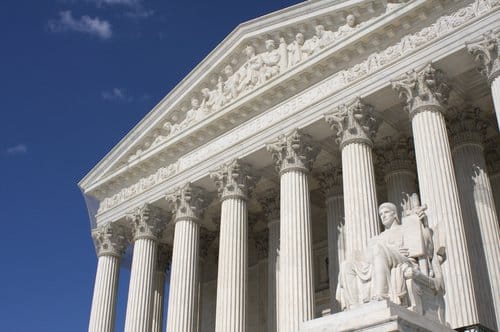For SCOTUS Rulings on Gay Marriage, It Isn't Always Black and White

Credit: Wikimedia Commons

The United States Supreme Court is expected to rule on the Defense of Marriage Act (Windsor v. United States) and California's Proposition 8 (Hollingsworth v. Perry) in the next few days. There is a good possibility the decision on these two cases will be reserved for last.
The Washington Post offers an easy to follow graphic on the potential rulings and what the implications would be for each decision. It also provides status for marriage rights in each state. Check it out.
The Supreme Court can either uphold DOMA or they can strike it down as unconstitutional. If the justices decide the law is unconstitutional, federal benefits currently offered to heterosexual couples will be extended to homosexual couples in twelve states and the District of Columbia.
Hollingsworth v. Perry is not a black and white case. There are a number of different routes the high court can go with this case.
The Supreme Court could strike down Prop 8 and rule that a state cannot withdraw marriage rights to gay couples once those rights have already been offered. This decision would only affect California.
The justices could decide states cannot offer marriage benefits under a civil union, but withhold the label 'marriage.' This decision would have slightly broader implications as it would affect seven states.
California, Colorado, Hawaii, Nevada, Oregon, Illinois, and New Jersey currently allow same-sex couples to join in a civil union and can receive the same benefits a heterosexual married couple is eligible to receive, but the union cannot be legally labeled a marriage. If the high court rules a state cannot withhold the marriage label if they offer marriage benefits for civil unions, California is not the only state that will have to alter its laws.
More states will be affected if the Supreme Court rules Proposition 8 to be unconstitutional. If it the justices decide a state cannot deny same-sex couples the right to marry, it will impact marriage bans in 35 states. There are certainly regions in the United States where this decision would be extremely unpopular.
If the high court upholds Prop. 8 or decides it lacks standing, the only state affected is California. Obviously, if Prop. 8 is upheld, gay marriage will be banned in the state. If it is decided Prop. 8 lacks standing, same-sex marriage will continue in California and it could open the door for additional litigation challenging marriage bans nationwide.



